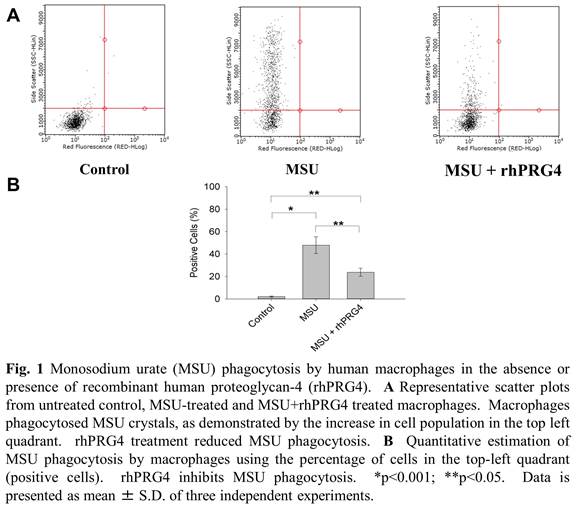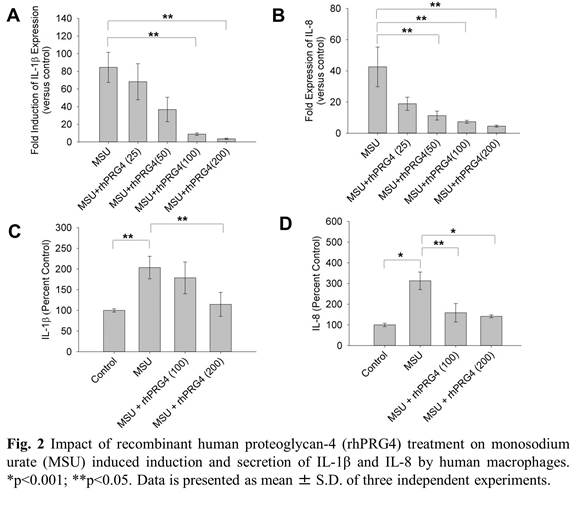Session Information
Date: Tuesday, November 15, 2016
Title: Metabolic and Crystal Arthropathies I: Mechanisms of Disease
Session Type: ACR Concurrent Abstract Session
Session Time: 4:30PM-6:00PM
Background/Purpose: Gout is an inflammatory arthritis caused by precipitation of monosodium urate (MSU) crystals in synovial joints. MSU crystals interact with resident macrophages that release pro-inflammatory cytokines, interleukin-1 beta (IL-1β) and chemokines, interleukin-8 (IL-8). MSU crystals are phagocytosed in a process mediated by toll-like receptor (TLR2). Proteoglycan-4 (PRG4) is a lubricating mucinous glycoprotein released by synovial fibroblasts and exhibits a multifaceted homeostatic role in the synovial joint. We have recently shown that recombinant human PRG4 (rhPRG4) can inhibit agonist-induced TLR2 activation. The objective is to evaluate the efficacy of rhPRG4 in modulating MSU activation of macrophages. We hypothesized that rhPRG4 inhibits MSU phagocytosis by human macrophages dose-dependently and inhibits MSU-induced IL-1β and IL-8 gene expression.
Methods: THP1 human monocytes were differentiated into macrophages using 5ng/ml phorbol 12-myristate13-acetate for 48 hours at 37oC. A total of 500,000 macrophages were plated per well in sterile tissue culture plates and were treated with MSU crystals (100μg/mL) for 6 hours at 37oC, and afterwards in the absence or presence of rhPRG4 (25, 50, 100, 200μg/mL) for 24 hours at 37oC. Following incubation, the percent of macrophages that phagocytosed MSU was quantitatively determined using flow cytometry, based on an increase in cellular side-scatter. RNA was extracted and cDNA was synthesized followed by qRT-PCR using TaqMan Fast Advanced Master Mix and primers for human IL-1β and IL-8. IL-1β and IL-8 media supernatant concentrations were determined by commercially available ELISA.
Results: Flow cytometry scatter plots of MSU phagocytosis by macrophages in the absence or presence of rhPRG4 is shown in figure 1A. rhPRG4 treatment significantly inhibited MSU phagocytosis (p<0.05) (fig. 1B). MSU treatment resulted in a significant induction of IL-1β gene expression which was inhibited by rhPRG4 treatment (100 and 200μg/ml) (p<0.05; fig. 2A), and a significant reduction in IL-1β protein concentration at the 200μg/ml rhPRG4 concentration (p<0.05; fig. 2C). Likewise, MSU treatment resulted in a significant induction of IL-8 gene expression which was inhibited by rhPRG4 treatment (50, 100 and 200μg/ml) (p<0.05; fig. 2B), and a significant reduction in IL-1β protein concentration at the 100 and 200μg/ml rhPRG4 concentrations (p<0.05 and p<0.001; fig. 2D).
Conclusion: rhPRG4 inhibits MSU phagocytosis and the resultant inflammatory response by human macrophages and may be useful as a biological treatment for acute gout exacerbations. 

To cite this abstract in AMA style:
Qadri M, Schmidt T, Elsaid K, Jay G. Recombinant Human Proteoglycan-4 (rhPRG4) Inhibits Monosodium Urate (MSU) Crystal Phagocytosis By Human Macrophages and Resultant Inflammatory Response [abstract]. Arthritis Rheumatol. 2016; 68 (suppl 10). https://acrabstracts.org/abstract/recombinant-human-proteoglycan-4-rhprg4-inhibits-monosodium-urate-msu-crystal-phagocytosis-by-human-macrophages-and-resultant-inflammatory-response/. Accessed .« Back to 2016 ACR/ARHP Annual Meeting
ACR Meeting Abstracts - https://acrabstracts.org/abstract/recombinant-human-proteoglycan-4-rhprg4-inhibits-monosodium-urate-msu-crystal-phagocytosis-by-human-macrophages-and-resultant-inflammatory-response/
